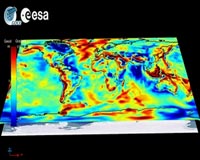| . |  |
. |
Ann Arbor MI (SPX) Mar 11, 2011 Many Americans are skeptical about whether the world's weather is changing, but apparently the degree of skepticism varies systematically depending on what that change is called. According to a University of Michigan study published in the forthcoming issue of Public Opinion Quarterly, more people believe in "climate change" than in "global warming." "Wording matters," said Jonathon Schuldt, the lead author of the article about the study and a doctoral candidate in the U-M Department of Psychology. Schuldt co-authored the study with U-M psychologists Sara Konrath and Norbert Schwarz. For the research, they conducted a question wording experiment in the American Life Panel, an online survey conducted by RAND, with a national sample of 2,267 U.S. adults. Participants were asked to report their level of certainty about whether global climate change is a serious problem. In the following question, half the participants heard one version, half heard the other: "You may have heard about the idea that the world's temperature may have been going up [changing] over the past 100 years, a phenomenon sometimes called 'global warming' ['climate change']. What is your personal opinion regarding whether or not this has been happening? Overall, 74 percent of people thought the problem was real when it was referred to as climate change, while about 68 percent thought it was real when it was referred to as global warming. These different levels of belief may stem from the different associations carried by the two terms, Schuldt said. "While global warming focuses attention on temperature increases, climate change focuses attention on more general changes," he said. "Thus, an unusually cold day may increase doubts about global warming more so than about climate change. Given these different associations and the partisan nature of this issue, climate change believers and skeptics might be expected to vary in their use of these terms." As part of the study, the researchers also analyzed the use of these two terms on political think tank websites, finding that liberals and conservatives used different terms. Conservative think tanks tend to call the phenomenon global warming, while liberal think tanks call it climate change. And when the researchers analyzed responses to the survey by political orientation, they found that the different overall levels in belief were driven almost entirely by participants who identified themselves as Republicans. While 60 percent of Republicans reported that they thought climate change was real, for example, only 44 percent said they believed in the reality of global warming. In contrast, about 86 percent of Democrats thought climate change was a serious problem, no matter what it was called. Why weren't they influenced by question wording? "It might be a ceiling effect, given their high level of belief," Konrath said. "Or it could be that Democrats' beliefs about global climate change might be more crystallized, and as a result, more protected from subtle manipulations." The good news is that Americans may not be as polarized on the issue as previously thought. "The extent of the partisan divide on this issue depends heavily on question wording," said Schwarz, who is also affiliated with the U-M Ross Business School and the Institute of Social Research (ISR). "When the issue is framed as global warming, the partisan divide is nearly 42 percentage points. But when the frame is climate change, the partisan divide drops to about 26 percentage points."
Share This Article With Planet Earth
Related Links University of Michigan Climate Science News - Modeling, Mitigation Adaptation
 Satellite measures gravity's effect on climate change
Satellite measures gravity's effect on climate changeParis (AFP) March 9, 2011 After nearly two years in space, the European satellite "GROCE" has collected the raw data needed to map variations in Earth's gravity field, the European Space Agency has said. The data will help scientists better understand the impact of climate change on sea levels, ice sheets, and ocean circulation systems. ESA launched the five metres long (16 feet), 1,050 kilogrammes (2,310 pounds) ... read more |
|
| The content herein, unless otherwise known to be public domain, are Copyright 1995-2010 - SpaceDaily. AFP and UPI Wire Stories are copyright Agence France-Presse and United Press International. ESA Portal Reports are copyright European Space Agency. All NASA sourced material is public domain. Additional copyrights may apply in whole or part to other bona fide parties. Advertising does not imply endorsement,agreement or approval of any opinions, statements or information provided by SpaceDaily on any Web page published or hosted by SpaceDaily. Privacy Statement |